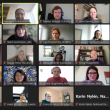What has PRO-Ethics learnt from engaging with research and innovation experts?
27. Apr. 2023
In January and March 2023, PRO-Ethics brought together research ethics and integrity experts and research and innovation organisations respectively to gather insights that could help to better shape our ethics guidelines.
The benefits from the two stakeholder engagement workshops were twofold. First, research ethics and integrity experts offered us useful feedback on ways to improve the usability of our framework and ensure alignment with other works that support ethical participation of citizens in research activities. Second, engaging with research and innovation (R&I) experts who we designed the ethics framework around, gave us direct insights into the kinds of contexts that might warrant use of our guidelines.
Meeting with research ethics and integrity experts
Research ethics and integrity experts are familiar with the many ways ethics guidelines can support the ethical participation of citizens in research and innovation. Therefore, the feedback gathered from these experts was invaluable to consider the ways the guidelines would need to support different use cases. Three key lessons were gathered as a result:
1. Name the user: The draft version of PRO-Ethics' guidelines that we presented to research ethics and integrity experts, referenced both research funding organisations and research practising ones. The guidelines have been designed to serve both these groups, but the ethics and integrity experts rightly pointed out that these two groups would operate in different ways. While research funding organisations can influence research practising organisations, the same cannot be said in the reverse. Naming the specific ways that the guidelines may be used differently, during different points in the research process was therefore considered extremely important.
2. Include concrete examples: While PRO-Ethics guidelines provide some examples on how to apply the framework, we received feedback that more specificity was required to avoid the examples being too general. Ensuring that the framework could be translated to different contexts would be highly dependent on concrete examples that both identified target groups could relate to them. Therefore, keeping the PRO-Ethics framework high-level enough for use in a wide range of activities but still providing some specificity to ensure correct translation was a main takeaway.
3. Consider citizen needs: A discussion around who the framework should serve arose as the guidelines are not intended for use by citizens themselves. However, we heard that it is important to have guidelines that also support correct communication with citizens. While our target audience will not change, PRO-Ethics will aim to ensure an accessible format for the guidelines that can support translation of principles for citizens and other non-experts.
Getting guidelines in front of research and innovation experts
When we brought together research and innovation experts, we were interested in both their individual experience of involving citizens in R&I, and on their first thoughts on the ethics framework and guidelines. The experts who joined us included organisations who had experience of involving citizens in specific projects. However, few had considered citizen participation in strategic decision-making or evaluation. Three key lessons we gathered from this group related to:
1. Ideal application vs. practical reality: We heard that the guidelines may offer ideal cases that many research funding and practising organisations might struggle to implement in their entirety. Research funding organisations for example may consider adding ethical requirements to proposals but they might still play a less of an active role in ensuring ethical application in funded works. Therefore, the guidelines would benefit from thinking about all the different actors' use cases, from funders down to specific researchers. Templates and other useful practical resources could support this.
2. Consideration of the platform: The platform where the final guidelines will live will play a big role in the final use of this resource. Considering an accessible format online, potentially as a toolkit or an interface, as well as the original document form, will support both use and sharing of the guidelines. The platform can ensure that the guidelines speak the same language to the different target groups in a way that is easy to understand and navigate - allowing each target group to get what they need.
3. Examples vs. questions: Mirroring feedback from the research ethics and integrity experts, we again heard that the open questions in the guidelines might only be useful to advanced users. For those just starting to think about citizen participation, concrete examples with “more flesh” would be needed to help those who have no idea about where to start gather ideas on how to apply the principles to their work.
Conclusion
All the feedback and insights we have received have greatly shaped the PRO-Ethics framework and accompanying guidelines. We are extremely grateful to all the experts who attended our workshops and were so generous with their contributions. As our project comes to an end, we will be working hard to incorporate the lessons learned about how to make PRO-Ethics have an impact beyond our project's life cycle. Our final conference towards the autumn 2023 will be our final opportunity to share our guidelines on how to successfully involve citizens in research and innovation processes.
Related Articles:
- News: First PRO-Ethics Newsletter
- News: First PRO-Ethics Policy Brief
- News: Kick-off PRO-Ethics
- News: Learnings from one year of PRO-Ethics
- News: PRO-Ethics launches its project website
- News: PRO-Ethics Online Cross-Learning Workshop
- News: PRO-Ethics Workshop with RFOs & research ethics and integrity experts
- News: Take part in the PRO-Ethics online consultation
- News: Winner of the PRO-Ethics Open Call
- Project: Participatory Real Life Experiments in Research and Innovation Funding Organisations on Ethics
- News: Pilot Reflection Workshop in Brussels
- News: PRO-Ethics 3rd Cross-Learning Workshop
- Event: Herausforderung "Partizipation"
- News: Call for Contributions: Connect. Collaborate. Create. Conference in Paris
- News: Participation in research funding and implementation
- News: "Connect.Collaborate.Create." Conference successfully completed!














































